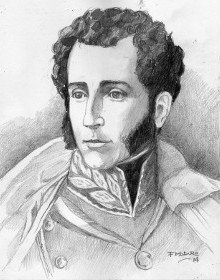Bunnypuncher's daily giveaway 6/11/2018 - 15 SBD total in prizes
Antonio José de Sucre
Born in Cumaná on February 3, 1795.
He died in the Berruecos Mountains on June 4, 1830.
Antonio José de Sucre
Antonio José de Sucre was one of the most successful and admired heroes of Latin American independence. He stood out as a military man in the many victories he achieved on the battlefields, demonstrating his innate talent for leading troops. In this way he achieved fundamental triumphs to liberate the continent from Spanish domination, with the battle of Ayacucho being his greatest work of war. As a politician, he was the president of Bolivia and was concerned about public services and the proper functioning of the public administration. He was rigorous in serving sentences for crimes or acts of corruption but was pious and fair to the defeated.
It also promoted causes related to the abolition of slavery and better treatment of indigenous peoples. He also stood out as a diplomat when it came to actively participating in the Armistice of 1820. He was one of the most complete figures of the independence era.
Youth and Role in Independence
Antonio José de Sucre was born in Cumaná on February 3, 1795. His parents were Lieutenant Vicente de Sucre y Urbaneja and María Manuela de Alcalá y Sánchez. At the age of 7, he witnessed his mother's death. He was educated until he was fifteen by his uncle José Manuel. He then studied mathematics and fortifications at the School of Engineers in Caracas in 1808. In 1810, he was promoted to the position of ensign in the army.
In 1812 he was promoted to lieutenant under the command of Francisco de Miranda, serving with distinction in the campaigns against the royalists. When the first republic fell, it emigrated to Trinidad, from where it returned in 1813, under the orders of Santiago Mariño. During that period he helped organize the Army of the East and was promoted to the rank of lieutenant colonel. The following year he witnessed the union of Western and Eastern forces in the valleys of Aragua. However, his army was defeated and had to go into exile in the West Indies. He returned to continue the efforts of the cause of Independence and by 1815 went on to fight in Guayana and El Orinoco. He was later appointed Commander of the province of Cumaná. In 1817 he was named Colonel by Simon Bolivar and in 1818 he went to Angostura, where the Liberator located his headquarters and gave his Angostura Address. There he became one of the best and closest lieutenants of Bolívar, beginning a lasting friendship between them. He continued his military ascent and by 1819 was appointed Brigadier General by Francisco Zea, president of the Venezuelan Congress, and ratified a year later in his post by El Libertador.
In 1820, as part of the Armistice signed between Bolivar and Morillo, he drafted the Treaty of Armistice and Regularization of War. This document was of vital importance because it put an end to the cruelty of the War to the Death and in the Sucre it laid the foundations for the humanitarian treatment of the defeated by the victors from any future conflict. He is therefore considered a pioneer of human rights. In 1821, he was appointed Chief of the Army of Southern Colombia, where he gained the independence of the provinces of Ecuador in the battles of Rio Bamba and Pichincha. He took part in the battle of Junín and won the battle of Ayacucho in 1824, under the command of the united army, which won him the title of Grand Marshal of Ayacucho. In 1825, it occupied the territory of Upper Peru, which became independent from the government of Buenos Aires, adopting the name of Bolivia. The Congress of the newly founded country commissioned Bolívar to draft its constitution.
He was Bolivia's first life president, a position he held for two years. From there he promoted several policies: among them the freedom of the slaves and the distribution of land to the Indians. However, under pressure from Peruvians, who opposed Bolivian independence, and the various riots that followed, the Grand Marshal of Ayacucho decided to resign the presidency in 1828.
He retired from public life and left for Ecuador with his daughter and his wife, Mariana Carcelén de Guevara, Marquise de Solanda. That same year, however, the Peruvian and Colombian republics clashed over territorial disputes and the latter again requested Sucre's help. That is how in 1829, and at the head of the Gran Columbian armies, he defeated the Peruvian forces at the Battle of Tarqui.
He then headed for Bogotá, a country in the process of disintegration. In the constitutional reform of 1830, promoted by the Admirable Congress for Greater Colombia, his enemies managed to enact a rule that stipulated that to be president or vice-president one must be 40 years old (Sucre was 35). Later, he was part of the commission that travelled to Venezuela to conciliate the parties and avoid sedition; however, the agreements were not binding.
As historian Tomás Polanco Alcántara puts it very well, "the symbol of Bolivar's continuity was Antonio José de Sucre. Gradually, through his personal talent, his intellectual gifts and his haughty, dignified and clean spirit, Sucre became the indispensable complement to Simón Bolívar. Respected by Argentines, Chileans and Peruvians, admired by Bolivians and Quiteños, without enemies in Venezuela and New Granada and with all his antecedents, Sucre was destined to be the natural successor of Bolivar".
However, that would not happen. On his way to Quito, where he was to be reunited with his family, he was ambushed and killed on June 4, 1830 in the Sierra de Berruecos, in Colombia. His death is attributed to José María Obando, military chief of the province of Pasto. On hearing the news of his death Bolívar said: "They killed him because he was my successor".
fuente[ ]
]